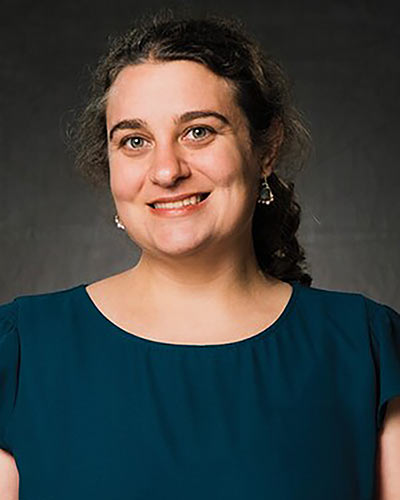
University of Maryland School of Medicine (UMSOM) Dean Mark T. Gladwin, MD, announced today the appointment of Elana J. Fertig, PhD, FAIMBE, as the new Director of the School’s Institute for Genome Sciences (IGS). She is internationally-recognized for her work in integrating spatial multi-omics technologies with mathematical models to develop a new predictive medicine paradigm in cancer. Spatial technologies allow researchers to learn about any cell type inside of natural tissue, including gene activity and cell interactions.
Dr. Fertig is currently a Professor of Oncology at the Johns Hopkins University with dual appointments in the Department of Applied Mathematics and Statistics and the Department of Biomedical Engineering. She also serves as the Co-Director of the Single Cell Consortium at the Johns Hopkins University School of Medicine, as well as the Co-Director of the Convergence Institute and the Associate Director of Quantitative Sciences at the Sidney Kimmel Comprehensive Cancer Center at Johns Hopkins. Her landmark research involves using computational methods to identify biomarkers and molecular mechanisms of therapeutic resistance from a vast trove of multi-platform genomics data.
IGS was founded in 2007 by Claire Fraser, PhD, who was president and director of The Institute for Genomic Research (TIGR) in Rockville, MD and who brought with her some of the faculty from there. Dr. Fraser was instrumental in creating high-throughput sequencing which changed the field of gene discovery and was part of the team to first map the complete genetic code of a free-living organism, Haemophilus influenza. In 2023, Dr. Fraser was elected to the National Academy of Sciences based on her ground-breaking scientific accomplishments during her career in genomic and microbial sciences.
Dr. Fraser served on the search committee for the new IGS director: “With her leadership experience building a quantitative and technological oncology program at Hopkins,” Dr. Fraser said. “I have no doubt that Dr. Fertig is perfectly positioned to lead IGS into the future and to new heights.”
Added Dean Gladwin: “Building on the legacy of founder Claire Fraser, PhD, the IGS is poised for even greater success by using genomic research mathematical models to enable researchers to understand the intricate interaction between genes, proteins, and environmental factors.” He is also the John Z. and Akiko K. Bowers Distinguished Professor and Dean, UMSOM, and Vice President for Medical Affairs, University of Maryland, Baltimore. “Dr. Fertig’s expertise, in using computational methods to blend mathematical modeling and artificial intelligence, will be an invaluable asset to IGS as faculty continue to revolutionize genomic science and apply technologies to basic science and clinical research.”
IGS research spans from basic evolutionary science to human health across the lifespan, with scientists applying genomics, microbiome, and systems biology approaches to better understand health issues, evolutionary biology, and the underpinnings of aging, cancer, brain development, addiction, and mental health. Current research projects include using metagenomics (the DNA makeup of multiple species of bacteria) to learn more about the function of the microbiome in the human body and the development of brain databases that include genetic data to investigate brain regions involved in persistent HIV infections, substance use disorder, and psychiatric and neurodevelopmental disorders.
During her 16 years at Hopkins, Dr. Fertig has built a transdisciplinary lab, with researchers spanning diverse scientific backgrounds to bridge the fields of mathematical theory, software development, cancer biology, and clinical oncology, all vital to help achieve her mission: to account for the complex evolutionary processes in cancer for therapeutic selection. With over 130 research publications, she is currently principal investigator or core lead on several National Cancer Institute Consortia grants, including the Cancer Systems Biology, Informatics Technologies for Cancer Research, and Translational and Basic Science in Early Lesions Consortia, and the National Institute of Aging Mouse SenNet Consortium. She is a co-investigator on several other major grants totaling more than $30 million.
“It’s humbling to have the opportunity to take on the Directorship of IGS and continue its rich legacy tracing its roots back to TIGR and the earliest advances in modern genomics research, while personally returning to the University of Maryland System,” said Dr. Fertig. “As Director, I look forward to continuing to foster IGS’s application and development of genomics technologies throughout human health, and to building new bridges to further cancer genomics and computational biology through partnerships with the Greenbaum Comprehensive Cancer Center and the Institute for Health Computing.”
The search committee was headed by Taofeek Owonikoko, MD, PhD, the Marlene and Stewart Greenebaum Professor of Oncology at UMSOM and Executive Director of the University of Maryland Marlene and Stewart Greenebaum Comprehensive Cancer Center (UMGCCC).
“In Dr. Fertig, we found the ideal visionary who will work to align IGS with the clinical and research missions of the Greenebaum Cancer Center as well with other UMSOM clinical departments to deliver cutting-edge advances in genome research and clinical genomic testing,” said Dr. Owonikoko. “Her experience in developing novel computational methods to analyze multidimensional data from advanced sequencing technology platforms will help advance our precision medicine mission that will ultimately improve treatments and outcomes for patients.”
Dr. Fertig earned a B.S. in Physics and Mathematics at Brandeis University and received her Ph.D. in Applied Mathematics from the University of Maryland, College Park (UMCP). Her unique blend interpreting biological systems by integrating these high-throughput data with artificial intelligence and mathematical modeling techniques is informed by her background in applied mathematics and numerical weather prediction from her graduate training at UMCP. She was a postdoctoral fellow in the Department of Oncology at Johns Hopkins University before accepting a faculty position at the university.
“I want to thank our entire search committee, led by Dr. Taofeek Owonikoko who made this recruitment come to fruition,” said Dean Gladwin. “I also want to extend my deep appreciation to Dr. Jacques Ravel for his leadership, dedication, and commitment to IGS in serving as Acting Director for more than two years.”